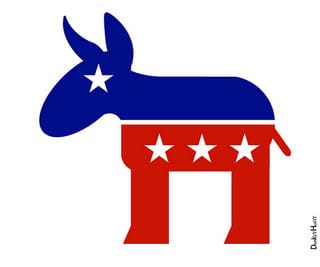The 2012 Democratic Party platform released this week calls for the expansion of “public school options for low-income youth,” a position that has appeared in varying language in every Democratic platform since 1992. But as Marc Fisher of the Washington Post reported this week, the Democratic platform historically has been “a jagged series of experiments” that once made room for more than just public-school choice.
 The Democratic Party's thinking on private-school choice has changed significantly over time. Photo by DonkeyHotey. |
Today, the national party fervently rejects vouchers for private and parochial schools, but that wasn’t the case thirty years ago. In 1972, Democrats sought to “channel financial aid by a Constitutional formula to children in non-public schools,” a position that reflected not only the influence of the Catholic Church at the time but also the drive, the values and the persistence of the late Daniel Patrick Moynihan.
Moynihan, who also crafted education planks for the Democratic platforms of 1964 and 1976, followed the party’s (and his own) guidance. Soon after his election to the U.S. Senate in 1976, he proposed a tuition tax credit for families with children in private and parochial schools. That bill was co-sponsored by an almost even number of Republicans and Democrats, and, as Moynihan defiantly wrote in Harper’s Magazine at the time, “Why should the anti-Catholicism of the Grant era be given a seat at the Cabinet table of a twentieth-century President.” But that president, Jimmy Carter, had come into office with the support of the National Education Association, which worked with H.E.W. Secretary Joseph A. Califano, Jr. to kill the bill.
Since then, the NEA and the American Federation of Teachers have exerted ever greater influence over the Democratic Party while the Catholic Church has wielded less. Democrats have embraced more forms of public school choices over time—the current platform recognizes charters, magnet schools, teacher-led schools, and career academies—while the Republican Party has claimed private-school choice as its own.
Today, in fact, vouchers (and kindred policies such as tax-credit scholarships) have emerged as the big divide between the Obama team and the GOP (and Mitt Romney), the two camps having found common ground on much else, such as charters, tenure reform, and teacher evaluations. But while the national Democratic Party has found it easy to disparage private-school choice, its position only makes life hard for a growing number of the state-level Democrats who have helped to give vouchers their recent momentum.
True, since the 2010 election, legislatures in at least fifteen states have either approved new private-school-choice programs or expanded existing ones. This has mostly been the work of Republican lawmakers but many of these efforts have also had Democratic support that barely existed before 2010. The Louisiana legislature created a statewide voucher program this year with the support of nineteen Democrats. The Florida Tax Credit Scholarship has enjoyed the support of nearly half the legislature’s Democrats for the past five years. Prominent Democrats such as Newark Mayor Cory Booker and former D.C. schools chancellor Michelle Rhee have endorsed vouchers for low-income kids. And the American Federation for Children, the chief lobbying group for school vouchers, has poured money into state Democratic Primary races in the last several years to support choice-friendly candidates.
Many of these Democrats are black and have framed their support for vouchers in terms of social justice. In response, their primary opponents, most of whom are union-backed, say that these Democrats are unfaithful to the party’s principles, a claim that’s linkable to the national party and its presidential nominee. In reality, the state Democrats who have been moving closer to the political center on school choice are reflecting the national party’s position from decades ago.
Moynihan once urged liberals to rethink their view of education. “State monopoly is no more appropriate to liberal belief in this field than in any other,” he wrote in his 1978 Harper’s essay. More state Democratic legislators have come to accept this, but they share no kinship with their party’s leaders. The Democratic Party deserves credit for embracing and enhancing public school choice, but it has failed to see what Moynihan would later describe as “the essentially liberal nature of this pluralist proposition.”
